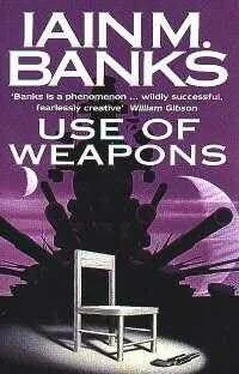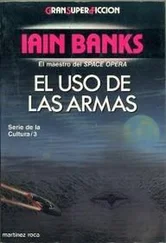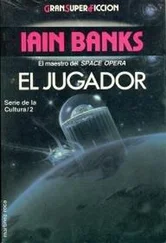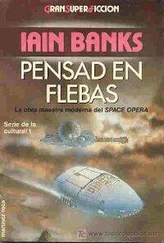Iain Banks - Use of Weapons
Здесь есть возможность читать онлайн «Iain Banks - Use of Weapons» весь текст электронной книги совершенно бесплатно (целиком полную версию без сокращений). В некоторых случаях можно слушать аудио, скачать через торрент в формате fb2 и присутствует краткое содержание. Год выпуска: 1990, ISBN: 1990, Жанр: Космическая фантастика, на английском языке. Описание произведения, (предисловие) а так же отзывы посетителей доступны на портале библиотеки ЛибКат.
- Название:Use of Weapons
- Автор:
- Жанр:
- Год:1990
- ISBN:1 85723 135 X
- Рейтинг книги:5 / 5. Голосов: 1
-
Избранное:Добавить в избранное
- Отзывы:
-
Ваша оценка:
- 100
- 1
- 2
- 3
- 4
- 5
Use of Weapons: краткое содержание, описание и аннотация
Предлагаем к чтению аннотацию, описание, краткое содержание или предисловие (зависит от того, что написал сам автор книги «Use of Weapons»). Если вы не нашли необходимую информацию о книге — напишите в комментариях, мы постараемся отыскать её.
Use of Weapons — читать онлайн бесплатно полную книгу (весь текст) целиком
Ниже представлен текст книги, разбитый по страницам. Система сохранения места последней прочитанной страницы, позволяет с удобством читать онлайн бесплатно книгу «Use of Weapons», без необходимости каждый раз заново искать на чём Вы остановились. Поставьте закладку, и сможете в любой момент перейти на страницу, на которой закончили чтение.
Интервал:
Закладка:
USE OF WEAPONS
IAIN M. BANKS
For Mic.
Acknowledgement
I blame Ken MacLeod for the whole thing. It was his idea to argue the old warrior out of retirement, and he suggested the fitness program, too.
“Slight Mechanical Destruction”
Zakalwe enfranchised;
Those lazy curls of smoke above the city,
Black wormholes in the air of noontime’s bright Ground Zero.
Did they tell you what you wanted to be told?
Or rain-skinned on a concrete fastness,
Fortress island in the flood;
You walked amongst the smashed machines,
And looked through undrugged eyes
For engines of another war,
And an attrition of the soul and the device.
With craft and plane and ship,
And gun and drone and field you played, and
Wrote an allegory of your regress
In other people’s tears and blood;
The tentative poetics of your rise
From a mere and shoddy grace.
And those who found you,
Took, remade you
(“Hey, my boy, it’s you and us knife missiles now,
Our lunge and speed and bloody secret:
The way to a man’s heart is through his chest!”)
- They thought you were their plaything,
Savage child; the throwback from wayback
Expedient because
Utopia spawns few warriors.
But you knew your figure cut a cipher
Through every crafted plan,
And playing our game for real
Saw through our plumbing jobs
And wayward glands
To a meaning of your own, in bones.
- The catchment of these cultured lives
Was not in flesh,
And what we only knew,
You felt,
With all the marrow of your twisted cells.
Prologue
“Tell me, what is happiness?”
“Happiness? Happiness… is to wake up, on a bright spring morning, after an exhausting first night spent with a beautiful… passionate… multi-murderess.”
“… Shit, is that all?”
In his fingers, the glass lay like something trapped, sweating light. The liquid it contained was the same colour as his eyes, and swilled around lethargically in the sunlight under his heavy-lidded gaze, the glinting surface of the drink throwing highlights onto his face like veins of quick gold.
He drained the glass, then studied it as the alcohol made its way down his throat. His throat tingled, and it seemed to him that the light tingled in his eyes. He turned the glass over in his hands, moving it carefully and smoothly, seemingly fascinated by the roughness of the ground areas and the silky slickness of the unetched parts. He held it up to the sun, his eyes narrowing. The glass sparkled like a hundred tiny rainbows, and minute twists of bubbles in the slender stem glowed golden against the blue sky, spiralling about each other in a fluted double helix.
He lowered the glass, slowly, and his gaze fell upon the silent city. He squinted out over the roofs and spires and towers, out over the clumps of trees marking the sparse and dusty parks, and out over the distant serrated line of the city walls to the pale plains and the smoke-blue hills shimmering in the heat haze beyond, beneath a cloudless sky.
Without taking his eyes from the view, he suddenly jerked his arm, throwing the glass over his shoulder, back into the cool hall, where it vanished into the shadows and shattered.
“You bastard,” said a voice, after a slight pause. The voice sounded both muffled and slurred. “I thought that was the heavy artillery. I nearly crapped myself. You want to see the place covered with shit?… Oh hell; I’ve bit the glass, too… mmm… I’m bleeding.” There was another pause. “You hear?” The muffled, slurred voice increased a little in volume. “I’m bleeding… You want to see the floor covered with shit and pedigree blood?” There was a scraping, tinkling sound, then silence, then, “You bastard.”
The young man on the balcony turned away from the view over the city and walked back inside the hall, only a little unsteadily. The hall was echoing and cool. The floor was mosaic, millennia old, veneered over in more recent times with a transparent, scratch-proof covering to protect the tiny ceramic fragments. In the centre of the hall there was a massive, elaborately carved banqueting table, surrounded by chairs. Around the walls were scattered smaller tables, more chairs, low chests of drawers, and tall sideboards, all made from the same dark, heavy wood.
Some of the walls were painted with fading but still impressive murals, mostly of battlefields; other walls, painted white, supported huge mandalas of old weapons; hundreds of spears and knives, swords and shields, pikes and maces, bolas and arrows all arranged in great whorls of pitted blade like the shrapnel of impossibly symmetrical explosions. Rusting firearms pointing importantly at each other above blocked-off fireplaces.
There were one or two dulled paintings and frayed tapestries on the walls, but vacant spaces for many more. Tall triangular windows of coloured glass threw wedges of light across the mosaic and the wood. The white stone walls rose to red piers at the top, supporting huge black beams of wood that closed over the length of the hall like a giant tent of angular fingers.
The young man kicked an antique chair the right way up and collapsed into it. “What pedigree blood?” he said. He rested one hand on the surface of the great table, and put the other up to and over his scalp, as if through thick long hair, though in fact his head was shaved.
“Eh?” said the voice. It appeared to come from somewhere beneath the great table the young man sat beside.
“What aristocratic connections have you ever had, you drunken old bum?” The young man rubbed his eyes with clenched fists, then, with his hands open, massaged the rest of his face.
There was a lengthy pause.
“Well, I was once bitten by a princess.”
The young man looked up at the hammer-beamed ceiling and snorted. “Insufficient evidence.”
He got up and went out onto the balcony again. He took a pair of binoculars from the balustrade and looked through them. He tutted, swaying, then retreated to the windows, bracing himself against the frame so that the view steadied. He fiddled with the focus, then shook his head and put the binoculars back on the stonework and crossed his arms, leaning against the wall and gazing out over the city.
Baked; brown roofs and rough gable ends, like crusts and ends of bread; dust like flour.
Then, in an instant, under the impact of remembrance, the shimmering view before him turned grey and then dark, and he recalled other citadels (the doomed tent city in the parade-ground below, as the glass in the windows shook; the young girl — dead now — curled up in a chair, in a tower in the Winter Palace). He shivered, despite the heat, and shoved the memories away.
“What about you?”
The young man looked back into the hall. “What?”
“You ever had any, umm, connections, with our, ah… betters?”
The young man looked suddenly serious. “I once…” he began, then hesitated. “I once knew some-one who was… nearly a princess. And I carried part of her inside me, for a time.”
“Say again? You carried…”
“Part of her inside me, for a time.”
Pause. Then, politely: “Wasn’t that rather the wrong way round?”
The young man shrugged. “It was an odd sort of relationship.”
He turned back to the city again, looking for smoke, or people, or animals, or birds, or anything that moved, but the view might as well have been painted on a backdrop. Only the air moved, shimmering the view. He thought about how you could make a backdrop tremble just so to produce the same effect, then abandoned the thought.
Читать дальшеИнтервал:
Закладка:
Похожие книги на «Use of Weapons»
Представляем Вашему вниманию похожие книги на «Use of Weapons» списком для выбора. Мы отобрали схожую по названию и смыслу литературу в надежде предоставить читателям больше вариантов отыскать новые, интересные, ещё непрочитанные произведения.
Обсуждение, отзывы о книге «Use of Weapons» и просто собственные мнения читателей. Оставьте ваши комментарии, напишите, что Вы думаете о произведении, его смысле или главных героях. Укажите что конкретно понравилось, а что нет, и почему Вы так считаете.












